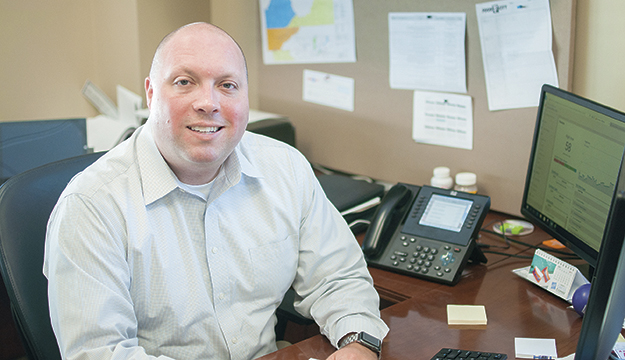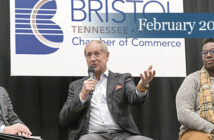Photo above: Kevin Stafford, vice president of Marketing, Food City
The fifth in a series of “Operation Tomorrow’s Workforce” articles by the United Way of Southwest Virginia
We cannot reap a harvest if we do not plant seeds, nor can we reap a harvest if we plant seeds but fail to care for them as they grow. We’re not talking only about crops, though. The statement also holds true speaking metaphorically about Southwest Virginia’s young people.
According to the McKinsey & Company report Education to Employment: Designing a System that Works, America, along with the rest of the world, is facing “two related global crises: high levels of youth unemployment and a shortage of people with critical job skills.” To combat this, many communities have developed partnerships to form work programs that engage youth in jobs that teach skills and help them gain valuable work experience.
A few years ago, Virginia Produce Company (VPC) created a summer work program for high school students. Seeing the value of their investment they added an annual shift staffed entirely by high school students – supervised by a high school student, Jared Hall.
Hall, now a 19-year-old operations manager, has been with VPC for five years. “When I started here at 14, I worked out in the farms, and when I was 16, I started working in the offices and doing maintenance. The summer before my junior year, Moir Beamer, the CEO, asked me if I wanted to gather up a bunch of my buddies to come work with me to unload watermelons and put them in vans. Simple task.”
It was not so simple at first.
“They were my friends, but they didn’t have my same work ethic,” said Hall. “I thought it was normal to work and to work hard because that’s the way my dad raised me, but it wasn’t something they knew; they didn’t have that encouragement at home like I did. It took a few days for them to get the team mentality, but they got it. Before the summer was over, they had a strong work ethic and they were moving faster than I was.”
But, the students in that summer work program in the Twin County region were the exception. In Southwest Virginia in 2015, around 3,800 16-24-year-olds were not in school or working according to the Annie E. Casey Foundation, and nationwide, only 30% of teens age 16 to 19 were employed.
Matthew Beamer, 29-year-old nephew of CEO Moir and Quality Control Manager for VPC has grown up working for the company. He said, “It’s kind of alarming – the number of people I’ve seen who haven’t had exposure to work. Work experience in a program like we have or even an entry-level job prepares you for the future. We feel like it’s hard for the younger students to get a job that works around their school schedule and their obligations, but we feel like they should be given that chance and have opportunities to learn through employment. As long as we can get our young students started working, and encourage them to work hard and work well, they’ll get the drive to keep going and work their way up – whether that’s here at Virginia Produce, or somewhere else.”
Hall agrees that employment programs like the ones he was involved with help students pave a realistic way to success. He said, “I think a lot of students have this idea of what their path to success looks like, but it’s not realistic. They graduate from high school or college and they don’t have any work experience to go with their diploma or their degree. It’s good to get a degree, but it’s also important to show that you made it a point to work and that you have some transferrable skills. They learn work ethic and structure. They’re encouraged, they find value in their work, and they learn that quality is important. They feel a sense of pride in their team. They gain confidence in themselves and their abilities. They feel good when they leave here – like they can do something with their lives. We’re giving them a chance at a young age to see their potential. We are helping the next one in line.”
Another regional company is also helping the next one in line – coincidentally, a regional supermarket chain.
Food City employs workers as young as 14, giving them a chance to learn those valuable skills that Hall mentioned. Kevin Stafford, currently Vice President of Marketing for Food City, began his career with the company at the age of 16 as a courtesy clerk in the store. His responsibilities included bagging groceries, retrieving carts from the lot, cleaning, and helping carry bags to customers’ vehicles.
Stafford said, “When you’re 16 and you spend all day pushing buggies, keeping things clean, bagging groceries – the first foundational thing you learn is to work hard. I understood that hard work pays off, but it gave me a real opportunity to see that the harder you work, the more opportunities will come.”
Opportunities did come. Stafford, now 36, has worked for Food City for a little over 20 years, moving through positions in customer service, front-end management, and help desk operations. While navigating career shifts, he also started a family and went back to school to obtain his MBA. Eventually, he became director of front end operations for the entire company, and most recently made a shift to vice president of Marketing.
But he continues to look back on the experiences he had when he was 14 and 15 that taught him more than he would have ever imagined.
Stafford said, “A lady named Debbie that I worked for – she taught me about the importance of attention to detail. As part of closing duties when I was a courtesy clerk, we had to clean behind things. My supervisor – her name was Debbie – she would hide cookies behind the area where they stocked bags to make sure we were cleaning behind it.”
Not only did his work at a young age teach him about attention to detail, managing his paycheck and arriving to work on time, but his work also advanced his social and emotional development.
Stafford said, “One thing that was amazing to learn was that you can make a difference in the lives of adults when you’re just a young kid. One story that sticks with me is from that same time period when I was a courtesy clerk. We’d ask everyone with a buggy if they needed help out with their groceries. I asked this gentleman if he needed help out with his groceries; he looked perfectly healthy, but he told me he’d like for me to help him out. I got to his car and put his groceries in. He turned around with a tear rolling down his face and told me he had a disease and that it would have been extremely difficult for him to put those groceries in his car by himself. He said, ‘You don’t know what kind of difference you just made.’”
It’s true that you reap what you sow. If we make the time now to strengthen our systems and create new opportunities for disconnected youth, we will reap the harvest of an advancing economy and a stronger workforce for Southwest Virginia’s future.




